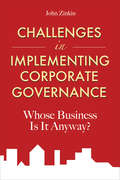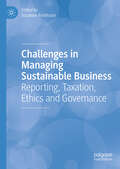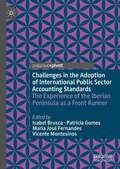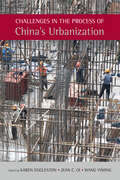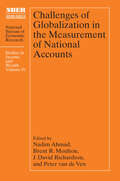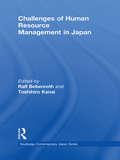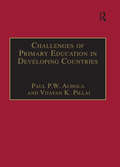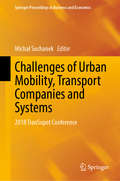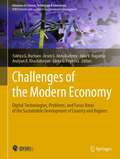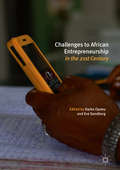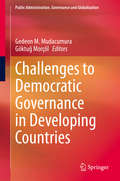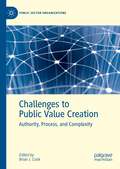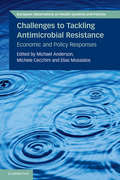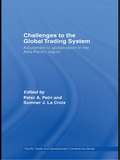- Table View
- List View
Challenges in Higher Education for Sustainability (Management and Industrial Engineering)
by J. Paulo Davim Walter Leal FilhoThis book presents the latest advances on the incorporation of sustainability in higher education. Different aspects such as the environmental, economic and social are here discussed. Several examples illustrating how sustainability in higher education is being pursued in different countries can be found in this book. Case studies include institutions from Kosovo, Brazil, Portugal, UK, Canada and USA.
Challenges in Implementing Corporate Governance: Whose Business is it Anyway?
by John Zinkin"John Zinkin's new book on Challenges in Implementing Corporate Governance is a welcome addition for board members and senior management on how to improve corporate governance in the post-crisis period. John correctly identifies that most boards on underperforming companies have three elements of failure: a lack of proper understanding of the business and its strategy; a total lack of appreciation of both the strategic and systemic risks created by new product markets; and a total failure by boards to ensure that the incentive structures for top management reflect long-term needs rather than short-term profits, thereby putting the company's future at risk. John has written a useful and practical handbook that is a must read for all board members on how to improve corporate governance."—Datuk Seri Panglima Andrew Sheng, Chief Adviser, China Banking Regulatory Commission and the Boards of the Qatar Financial Centre Regulatory Authority , Sime Darby Berhad and Khazanah Nasional "This timely book will interest those wanting to improve corporate governance and risk management. It should also appeal to anyone curious about what caused banks to fail in a number of markets in recent times, and the values which led to this failure. In considering principles which are essential to good governance, ACCA recognizes that corporate governance evolves and improves over time. We accept that organizations in different sectors and across the world operate in diverse environments in terms of culture, regulation, legislation and enforcement. What is appropriate, in terms of governance, for one type of organization will not be appropriate to all organizations. John Zinkin’s book seeks to address this challenge, analyzing the essential cultural and behavioral issues which sit at the heart of the challenges."—Paul Moxey, Head of Risk Management and Corporate Governance, Association of Chartered Certified Accountants "A scholarly combination of practical guidelines and strategic vision."—Lady Sylvia Jay CBE, Vice-Chairman, L'Oreal UK; Independent Director, Alcatel-Lucent, Compagnie de Saint Gobain, Lazard Limited and Carrefour "This is a highly topical and timely publication. Globally, the crisis that has gripped the financial services sector following the failure of well known global banks in recent years has focused attention on corporate governance. To restore confidence in the financial services sector is a long-term goal and effective corporate governance, together with the closely associated topic of risk management, has gripped not only governments and banks, but the public too. In this book, John Zinkin clearly asserts that financial institutions need to exert their responsibilities beyond their shareholders and far more into the wider group of stakeholders, including employees and wider society. In considering issues globally, John provides a book that is not only thought-provoking but pragmatic and useful at a time when stakeholders in our banks need to see real change in transparent, practical ways from those charged with governing our banks."—Ruth Martin, Managing Director, The Chartered Institute of Securities and Investment
Challenges in Managing Sustainable Business: Reporting, Taxation, Ethics and Governance
by Susanne ArvidssonOver the past 30 years sustainability has become increasingly important to scholarly research and business in practice. This book explores a variety of challenges faced by businesses when becoming sustainable and how this links to economic development and its corruption, ethical and taxation implications. Showcasing an interdisciplinary approach, the chapters explore topics such as business ethics, corporate responsibility, tax governance and sustainability practice.
Challenges in Tourism Research
by Tej Vir SinghIn this volume leading experts from different disciplines and diverse geographic regions discuss fundamental, often controversial topics in the field of tourism studies. The book attempts to understand, identify and analyse some of the perennial problems and challenges encountered by tourism researchers. The debates include topics such as the concept of the 'tourist', the long-term sustainability of tourism development, the growth of volunteer tourism and the vulnerability of tourism. Bringing together the collective wisdom of 37 renowned tourism scholars in a unique format, this is an important text for undergraduate and postgraduate students, tourism researchers and industry professionals.
Challenges in the Adoption of International Public Sector Accounting Standards: The Experience of the Iberian Peninsula as a Front Runner (Public Sector Financial Management)
by Vicente Montesinos Isabel Brusca Patrícia Gomes Maria José FernandesThe aim of this book is to take stock of the experiences of Spain and Portugal in the adaptation to the IPSAS, showing the advantages, disadvantages and the main challenges for its implementation. In chapter one, the book analyses the IPSAS and the conceptual framework, as well as the claimed benefits and criticisms of IPSAS. Chapter two makes an analysis of the diffusion of the IPSAS in the international framework and the process of harmonization in development in Europe. Chapter three and four analyze the process of adaptation to IPSAS in Portugal and Spain respectively. In the chapter five, there is a comparative analysis between Spain and Portugal, and the last chapter present the main conclusions. This book can help to understand the level of implementation of the reforms and how governments are applying the IPSAS.
Challenges in the Process of China’s Urbanization
by Karen Eggleston, Jean C. Oi, and Wang YimingThe same institutions that enabled China's massive urbanization and spurred its economic growth now require further reform and innovation. To address the issues facing the next phase of the nation's transformation, the National New Urbanization Plan (2014–20) set ambitious targets for sustainable, human-centered, and environmentally friendly urbanization. This volume explores the key institutional and governance challenges China will face in reaching those goals. Its policy-focused contributions from leading social scientists in the United States and China explore aspects of urbanization ranging from migration and labor markets to agglomeration economies, land finance, affordable housing, and education policy. Subjects covered in the eleven chapters include: Institutional problems leading to fiscal pressures on local governments and unequal provision of social services to migrant families The history of land financing and threats to its sustainability The difficulty of sorting out property rights in rural China How administrative redistricting has allowed the urbanization of geographical administrative places to outpace the urbanization of populations within those areas How the hukou system may not be the sole, or even primary, mechanism restricting migrants from public goods, such as their childrens' education Whether the nation's food security is threatened by its ongoing urbanization The current state of the provision of low-income housing, and future challenges
Challenges of Globalization and Prospects for an Inter-civilizational World Order
by Ino RossiAn encyclopedic coverage of regions and issues, some of the best scholarship in the field, and an emphasis on solutions make this book an important contribution.” Miguel Angel Centeno, Princeton University“Exceptionally diverse and comprehensive… [this] is certain to become an essential reference work on the economic, moral, human rights and civilizational aspects of globalization.” Daniel Chirot, University of Washington“…a much-needed comprehensive, updated, and non-Western-centric introduction to the origins, dynamics, and latest trends of globalization as seen from the perspectives of Global North and South.” Ho-fung Hung, Johns Hopkins University“..a timely and solid overview of the key theoretical and methodological challenges faced across the social sciences as we seek to understand the possible futures of globalization.” Roberto Patricio Korzeniewicz, University of Maryland“Ino Rossi has brought together a range of authors covering multiple aspects of our current condition. This diversity of engagements is what we need to sort out our major challenges.” Saskia Sassen, Columbia University"It is the best collection of studies on ecological globalization, latest impact on the Global South, millennia ascent of individual rights, and alternative designs of the future world order." Alvin Y. So, Hong Kong University of Science and TechnologyThis is a must-read volume on globalization in which some of the foremost scholars in the field discuss the latest issues. Truly providing a global perspective, it includes authorship and discussions from the Global North and South, and covers the major facets of globalization: cultural, economic, ecological and political. It discusses the historical developments in governance preceding globalization, the diverse theoretical and methodological approaches to globalization, and analyzes underdevelopment, anti-globalization movements, global poverty, global inequality, and the debates on international trade versus protectionism. Finally, the volume looks to the future and provides prospects for inter-civilizational understanding, rapprochement, and global cooperation. This will be of great interest to academics and students of sociology, social anthropology, political science and international relations, economics, social policy, social history, as well as to policy makers.
Challenges of Globalization in the Measurement of National Accounts (National Bureau of Economic Research Studies in Income and Wealth)
by Nadim Ahmad, Brent R. Moulton, J. David Richardson, and Peter van de VenAn essential collection at the intersection of globalization, production supply chains, corporate finance regulation, and economic measurement. The substantial increase in the complexity of global supply chains and other production arrangements over the past three decades has challenged some traditional measures of national income account aggregates and raised the potential for distortions in conventional calculations of GDP and productivity. This volume examines a variety of multinational business activities and assesses their impact on economic measurement. Several chapters consider how global supply chains complicate the interpretation of traditional trade statistics and how new measurement techniques can provide information about global production arrangements. Other chapters examine the role of intangible capital in global production, including the output of factoryless goods producers and the problems of measuring R&D in a globalized world. The studies in this volume also explore potential ways to enhance the quality of the national accounts by improving data collection and analysis and by updating the standards for measurement.
Challenges of Growth and Globalization in the Middle East and North Africa
by George T. Abed Hamid R. DavoodiThe Middle East and North Africa (MENA) is an economically diverse region. Despite undertaking economic reforms in many countries, and having considerable success in avoiding crises and achieving macroeconomic stability, the region's economic performance in the past 30 years has been below potential. This paper takes stock of the region's relatively weak performance, explores the reasons for this outcome, and proposes an agenda for urgent reforms.
Challenges of Healthcare Systems in the Era of COVID-19: Management Practices, Services Innovation and Reforms (Contributions to Management Science)
by Anastasios Karasavvoglou Persefoni Polychronidou Niccolò Persiani Ilaria Elisa Vannini Anna RomitiIn light of the Covid 19 pandemic and its impact on healthcare systems, this book examines health care innovations and service management models and discusses significant reforms and organizational and managerial changes in the healthcare systems of countries in the Balkans and Eastern Europe. It features contributions that shed new light on the impact of the pandemic on healthcare organizations and the lessons that can be drawn from this crisis for management practice.The book covers topics such as best practices in healthcare delivery, healthcare management, process and product innovation, digitization and information technologies, healthcare governance, collaborative healthcare experiences and networks, healthcare financing, and healthcare policy reform. It is aimed at scholars and practitioners in healthcare, as well as anyone interested in innovation in healthcare services and management.
Challenges of Human Resource Management in Japan (Routledge Contemporary Japan Series)
by Ralf BebenrothHuman resource management systems differ across corporations around the world. Japan has unique characteristics that create specific challenges for HRM and there is currently a lack of research focusing on Japanese HR issues available to westerners. This book examines the major challenges and dilemmas in human resource management as Japan's industrial society continues its resurgence in the global arena. The first part of the book deals with Japanese HRM from an international perspective, analysing the overall structure of Japanese HRM systems and comparing these with current international systems. The second part of this book looks at Japanese HRM from a domestic perspective and as such covers the micro issues of HRM practice in Japan. Written by a leading team of HRM experts from Japan, the UK, France, Australia and Canada, this book will be of interest to anyone interested in HRM in Japan, and international HRM more generally.
Challenges of Launching a Start-Up in China: Dorm99.com
by William C. Kirby F. Warren Mcfarlan Tracy Yuen MantyAfter graduating from Harvard Business School in June 2006, Ken Pao and Bill Li were ready to fully commit to the Internet start-up they had been working on since they first stepped foot on the business school campus. They moved to Beijing, rounded out their management team, received venture capital investment, developed joint-venture partnerships, and set key milestones to create a full-impact product launch for their social networking Web site catering to the college market. On the day of their launch, they faced a setback from China's Ministry of Education and were forced back to square one. Discusses the pluses and minuses of partnering with China's government ministries, the highs and lows of entrepreneurship, and the numerous opportunities available to entrepreneurship in China today.
Challenges of Modernization and Governance in South Korea
by Jae-Jung Suh Mikyoung KimFocusing on the sinking of the Sewol, a commercial ferry which capsized off the South Korean coast in April 2014, this book considers key issues of disaster, governance, civil society and the ideational transformation of human agents and their empowerment. Providing a lens through which to re-examine South Korean institutions, laws and practices, the volume examines the impact of the Sewol incident and what it reveals about the fault lines of South Korean society and governance. It addresses the repercussions of South Korea’s turn to a liberal democracy and neoliberal economy and reflects on the multilayered implications of the disaster in respect to the potential human costs of the country’s state-driven development policy and high stress modernisation. The book also highlights the relevance of the Korean experience for other societies on a similar developmental trajectories and facing similar challenges.
Challenges of Primary Education in Developing Countries: Insights from Kenya
by Paul P.W. Achola Vijayan K. PillaiPaul P.W. Achola and Vijayan K. Pillai address factors associated with wastage in primary school education and the solutions to ameliorate low participation in primary education. The book provides an examination of the factors associated with wastage, exploring the interconnectedness of non-enrollment, repetition and dropout. The authors demonstrate that reducing poverty through empowerment programs and citizen participation in school decisions are critical to improving primary school participation.
Challenges of Sustained Growth
by Padamja Khandelwal James Y. Yao Gamal Zaki El-MasryA report from the International Monetary Fund.
Challenges of Urban Mobility, Transport Companies and Systems: 2018 TranSopot Conference (Springer Proceedings in Business and Economics)
by Michał SuchanekThis proceedings volume examines individual city transports, transport companies and entire transport systems. Featuring select contributions presented at the 2018 TranSopot Conference in Sopot, Poland, this book provides an analysis of transportation solutions both at the micro-level (single city or single company) as well as the macro-level (whole transportation systems). The enclosed research and case studies provide a theoretical background for transport analysis but also new innovative and sustainable solutions to transportation while also increasing the efficiency of transport operations. Transportation is a very specific area of social and economic life. It creates countless opportunities and fulfills the need for mobility while also generating significant cost—direct for the company or indirect to societies. Planning and organizing transport is a task which requires a multi-level approach with a focus on operational, ecological and financial aspects. At a time in which many transport systems are unable to grow extensively due to lack of space or increased cost, these activities are even more crucial. The enclosed research from researchers, scholars and practitioners provides not only new theories but also empirical data and practical experience. The TranSopot 2018 conference is a continuation of a long series of conferences devoted to the topic of transport sector development. The goal of the conference is to exchange current trends and spread the results of current research into the fields of transport growth, development and management.
Challenges of the Modern Economy: Digital Technologies, Problems, and Focus Areas of the Sustainable Development of Country and Regions (Advances in Science, Technology & Innovation)
by Elena G. Popkova Julia V. Ragulina Yakhya G. Buchaev Arsen S. Abdulkadyrov Arutyun A. KhachaturyanThe book focuses on a systemic study of the challenges of the modern economy and related problems and areas of sustainable development of countries, regions, and businesses, with particular attention paid to the new prospects offered by the spread of digital technology. The book’s contribution to the literature is that it reveals the specifics and digital perspectives of supporting the SDGs in the economy at every level of the economy: country, regional, and corporate, considering sectoral specificities—this is reflected in six parts of the book. Part 1 identifies contemporary challenges of the modern economy as barriers to sustainable development. Part 2 reflects the future direction of sustainable development of the countries. Part 3 considers the problems and prospects for sustainable development of regions. Part 4 focuses on the problems and prospects for the sustainable development of enterprises and industries. Part 5 sheds light on the economic and legal foundations and cooperative mechanisms of sustainable development. Part 6 offers recommendations for enhancing the use of digital technologies offered by Industry 4.0 to support the SDGs. Scientists whose research interests include sustainable economic development are the primary target audience for this book. For the primary target audience, the book forms a systemic view of the global challenges of sustainable development and offers a set of scientific and methodological recommendations to provide an effective response to these challenges at every level of the economy. An additional audience for the book is practicing experts, who will find international best practices and applied recommendations to support sustainable economic development and implementation of the SDGs in the practice of state (national regulation and public administration of the region) and corporate (in various industries) management.
Challenges to African Entrepreneurship in the 21st Century
by Darko Opoku Eve SandbergThis volume offers an overview of the critical challenges faced by aspiring African entrepreneurs and their coping strategies to sustain and develop their businesses. Contributors to this volume detail the constraints placed on African entrepreneurs through rich case studies and challenge African leaders and international donors to review their own behaviors if they hope for African entrepreneurs to succeed.
Challenges to Central Banking from Globalized Financial Systems
by International Monetary FundThis publication contains a collection of papers presented at the IMF's ninth central banking conference, held in September 2002, which discuss key issues and policy challenges to the role of central banks arising from the integration of domestic and international markets and shifts in cross-border capital flows. These include determinations of exchange rates and monetary regimes, what can be done to prevent and deal decisively with financial crises, and considerations to balance monetary and financial-stability policy objectives.
Challenges to Democratic Governance in Developing Countries (Public Administration, Governance and Globalization #11)
by Gedeon Mudacumura Göktuğ MorçölDespite the large amounts of human and financial resources invested to foster democratic governance in developing countries, statistics show that the majority of these countries have not yet achieved significant improvements in living standards. While some regions make strides towards improving the living conditions of their citizens, Sub-Saharan Africa, for instance, is still trapped in poverty with more than 40% of its 600 million people living below the internationally recognized absolute poverty line of one US dollar per day. Poor governance and corruption should be highlighted as the most important systemic factors contributing to poverty in developing countries. As a result the institutional foundations of these countries are weakened, public funds are misappropriated, and policies and programs aimed at reducing poverty and fostering sustainable economic growth are undermined. It is therefore not surprising that a 2008 Transparency International report found a direct link between corruption and the failure of the societal institutions designed to achieve the Millennium Development Goals in the majority of developing countries. This book investigates the problems of democratic governance, particularly as they relate to corruption, and also whether democracy should be based on universal principles or local context and historical factors. It also analyses the rule of law, in promoting democratic governance and curbing corruption and if governmental, non-governmental organizations, and civil societies are effective in promoting democratic governance and curbing corruption. This book will go beyond identifying the challenges and offer plausible solutions that could be adapted to various developing countries. It is premised on the importance of bridging theory and practice, which has been lacking in most local and international development publications, making of interest to scholars and policy-makers alike concerned with public administration in developing countries.
Challenges to Monetary Policy from Financial Globalization: The Case of India
by Hélène K. Poirson A. Prasad Charles F. KramerA report from the International Monetary Fund.
Challenges to Public Value Creation: Authority, Process, and Complexity (Public Sector Organizations)
by Brian J. CookThis volume examines fundamental questions about the public value of public decisions. More specifically, it seeks to assess whether all public decisions create public value, if it is possible to know what value for the public as a whole a government decision will create, and how government officials can justify their decisions in terms of public value. Leading experts bring a diverse array of perspectives on the normative, epistemological, and processual challenges to identifying, describing, measuring, and evaluating the public value claims that public officials often articulate in defending their decisions, and the results that citizens often seek. The book will appeal to scholars and students of public policy and public administration.
Challenges to Punjab Economy: A Regional Perspective from India
by Baldev Singh Shergill and Swati MehtaThis volume looks at the challenges faced by the economy and society in Punjab, India. It probes into the economic issues, institutional development and resources imbalance faced by the Punjab economy. It discusses regional research problems and futuristic approaches for a developing economy. The chapters in this volume: focus on comprehending economic challenges, agrarian structure and development; markets, R&D and public policy; manufacturing sector; opportunities and possibilities; examine labour, caste and gender trajectories, exploring the question of freedom and livelihood; human, social and financial resources development; hunger, diet and disease; challenges for development paradigm; present the macro and micro facets of development processes in the region and offer a way forward for long-run growth, sustainability and inclusiveness amidst the dynamic fast-changing economies across the globe. Comprehensive and analytical in its approach, this volume will be of interest to young researchers, scholars, practitioners and policymakers working in the fields of Development Economics, Regional Economics, Evolutionary Economics, Sustainable Economics, Agrarian Development, Manufacturing and Labour.
Challenges to Tackling Antimicrobial Resistance: Economic and Policy Responses (European Observatory on Health Systems and Policies)
by Jonathan NorthAntimicrobial resistance (AMR) is a biological mechanism whereby a micro-organism evolves over time to develop the ability to become resistant to antimicrobial therapies such as antibiotics. The drivers of and potential solutions to AMR are complex, often spanning multiple sectors. The internationally recognised response to AMR advocates for a 'One Health' approach, which requires policies to be developed and implemented across human, animal, and environmental health. To date, misaligned economic incentives have slowed the development of novel antimicrobials and limited efforts to reduce antimicrobial usage. However, the research which underpins the variety of policy options to tackle AMR is rapidly evolving across multiple disciplines such as human medicine, veterinary medicine, agricultural sciences, epidemiology, economics, sociology and psychology. By bringing together in one place the latest evidence and analysing the different facets of the complex problem of tackling AMR, this book offers an accessible summary for policy-makers, academics and students on the big questions around AMR policy.
Challenges to the Global Trading System: Adjustment to Globalization in the Asia-Pacific Region (PAFTAD (Pacific Trade and Development Conference Series))
by Peter A. Petri Sumner J. La CroixInternational trade continues to expand robustly in East Asia and elsewhere, but global trade negotiations have collapsed and globalization is widely criticized. In this book, the participants of the thirtieth Pacific Trade and Development Conference—including the then-Director General of the World Trade Organization, and leading government officials, academics and executives from a dozen major Pacific Rim economies—debate whether global negotiations have ended once and for all, or are suffering temporarily from ‘globalization fatigue;’ whether East Asia’s new regional partnerships will advance or undermine the global trading system; and whether the region’s trade tensions with the United States will intensify or subside. They provide new empirical evidence on how trade affects the distribution of income, the location of pollution-intensive industries, the causes of ‘outsourcing,’ the structure of the intellectual property regime, and international security. And they probe the implications of adjustment to globalization: how can countries reap the benefits of trade while controlling the risks faced by the poor and, perhaps more importantly, the politically strong? Challenges to the Global Trading System is an invaluable resource for students and scholars of Asia-Pacific studies, international relations and development studies, as well as those with a more general interest in Asian studies.

